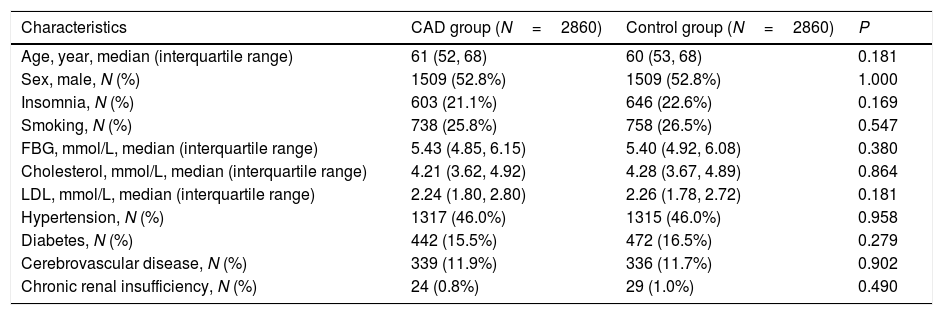Birth month and climate affect lifetime disease risk, while the underlying mechanisms remain largely elusive. It is vital to investigate the risks of coronary artery disease (CAD) and its complications in patients born in different months.
MethodsA total of 12,263 patient medical records were reviewed from the BioBank of First Affiliated Hospital of Xinxiang Medical University, with 4729 records from patients with CAD (CAD group) and 7534 records from control patients without CAD (control group). Two groups of patients were matched by the propensity score matched method. Birth months were compared between two groups of patients. The relationships between birth month and the numbers of CAD and its complications were also investigated. Interestingly, we also explore the relationship between the birth seasons and the numbers of CAD and its complications.
ResultsCompared to control, CAD group had greater CAD risks for patients born in November (OR 1.390, 95% CI 1.090–1.772), December (OR 1.358, 95% CI 1.067–1.730), and February (OR 1.332, 95% CI 1.043–1.700) compared to those born in May. Compared to patients born in December, patients born in January to March and May to September had greater risk of heart failure (P<0.05). There was no difference in the incidence of myocardial infarction, conduction block, and atrial fibrillation across birth months (P>0.05). In terms of birth season, patients born in winter have greater CAD risk than those born in spring (OR 1.247, 95% CI 1.075–1.447). And there was no difference in the incidence of CAD complications across with birth seasons (P>0.05).
ConclusionsThere was a correlation between birth month and CAD. People born in November, December, and February had greater CAD risk, and people born in winter had greater CAD risk. Among CAD patients, those born in January to March and May to September had the greater risk of heart failure.
El mes de nacimiento y el clima están relacionados con el riesgo de padecer una enfermedad crónica, aunque siguen desconociéndose en gran medida los mecanismos subyacentes. Resulta fundamental investigar los riesgos de padecer una arteriopatía coronaria (AC) y sus complicaciones en pacientes nacidos en distintos meses.
MétodosSe revisaron un total de 12.263 historias clínicas de pacientes extraídas del Biobanco del primer hospital afiliado de la Universidad Médica de Xinxiang, de las cuales 4.729 correspondían a pacientes con una AC (grupo con AC) y 7.534 correspondían a pacientes control sin una AC (grupo comparativo). Se emparejaron a 2 grupos de pacientes siguiendo el método de pareamiento por puntaje de propensión, y se compararon los meses de nacimiento de los pacientes de ambos grupos. También se investigó la relación existente entre el mes de nacimiento y el número de casos de AC y sus complicaciones. Resulta interesante destacar que también exploramos la relación existente entre las estaciones de nacimiento y el número de casos de AC y sus complicaciones.
ResultadosEn comparación con los pacientes del grupo comparativo, los pacientes del grupo con AC nacidos en noviembre (razón de posibilidades odds ratio [OR]: 1,390; intervalo de confianza [IC] del 95%: 1,090-1,772), diciembre (OR: 1,358; IC 95%: 1,067-1,730) y febrero (OR: 1,332; IC 95%: 1,043-1,700) presentaban un mayor riesgo de padecer una AC en comparación con los nacidos en mayo. En comparación con los pacientes nacidos en diciembre, los pacientes nacidos entre enero y marzo, y entre mayo y septiembre, presentaron un mayor riesgo de padecer una insuficiencia cardíaca (P<0,05). No se observaron diferencias en la incidencia de infarto de miocardio, bloqueo de la conducción y fibrilación auricular entre los distintos meses de nacimiento (P>0,05). En cuanto a la temporada de nacimiento, los pacientes nacidos en invierno presentaron un mayor riesgo de desarrollar una AC que los nacidos en primavera (OR: 1,247; IC 95%: 1,075-1,447). No se observaron diferencias en la incidencia de complicaciones de la AC entre las distintas temporadas de nacimiento (P>0,05).
ConclusionesSe observó una correlación entre el mes de nacimiento y la AC. Tanto las personas nacidas en los meses de noviembre, diciembre y febrero, como las nacidas en la temporada de invierno presentaron un mayor riesgo de padecer una AC. Entre los pacientes con AC, los nacidos entre enero y marzo, y entre mayo y septiembre, presentaron un mayor riesgo de padecer una insuficiencia cardíaca.










